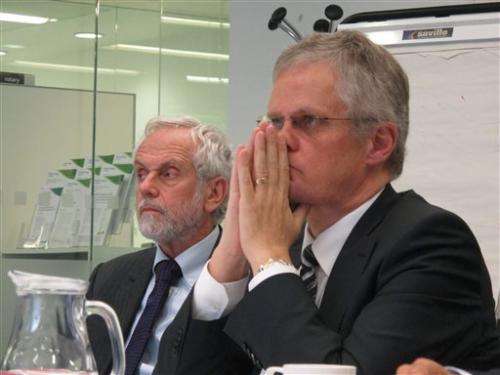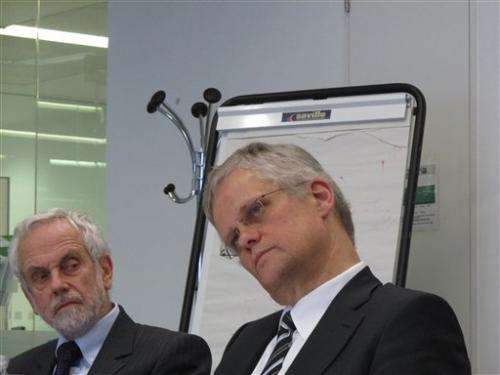Halldor Thorgeirsson, right, a senior director with the United Nations Framework Convention on Climate Change, and researcher Brian Hoskins take questions during a press briefing at London's Imperial College on Tuesday, Sept. 17, 2013. Thorgeirsson said international leaders are failing to fight global warming, appealing directly to the world's voters to pressure their politicians into taking tougher action against the buildup of greenhouse gases. (AP Photo/Raphael Satter)
(AP)—International leaders are failing in their fight against global warming, one of the United Nations' top climate officials said Tuesday, appealing directly to the world's voters to pressure their politicians into taking tougher action against the buildup of greenhouse gases.
Halldor Thorgeirsson told journalists gathered at London's Imperial College that world leaders weren't working hard enough to prevent potentially catastrophic climate change.
"We are failing as an international community," he said. "We are not on track."
Thorgeirsson, a senior director with the United Nations Framework Convention on Climate Change, was speaking with two years left to go before the world powers gather in Paris for another round of negotiations over the future of the world's climate, which scientists warn will warm dramatically unless action is taken to cut down on the emission of greenhouse gases such as carbon dioxide.
One of the main points of contention is how to divide the burden of emissions cuts between industrialized nations and emerging economies such as India and China, the world's top carbon polluter. The lack of progress in recent years has fueled doubts over whether a binding deal is possible at all.
Halldor Thorgeirsson, right, a senior director with the United Nations Framework Convention on Climate Change, and researcher Brian Hoskins take questions during a press briefing at London's Imperial College on Tuesday, Sept. 17, 2013. Thorgeirsson said international leaders are failing to fight global warming, appealing directly to the world's voters to pressure their politicians into taking tougher action against the buildup of greenhouse gases. (AP Photo/Raphael Satter)
Thorgeirsson seemed to strike a pessimistic note Tuesday, talking down the idea that Paris—or any other conference—would produce a grand bargain that would ensure the reductions needed to prevent a dangerous warming of the Earth's atmosphere. He even seemed to suggest that a global solution to the issue wasn't likely until the effects of climate change came barreling down on peoples' heads or flooding into their homes.
"I don't think that an international treaty will ever be the primary driver for the difficult decisions to be made," he warned. "It's the problem itself that will be the primary driver—and the consequences of that problem."
Quizzed on the repeated failure of the international community to organize a global deal on greenhouse gases, he said that the politicians involved had to be held to account.
"This is a question that needs to be asked at the ballot box," he said. "This is a question that needs to be asked of leaders at all levels."
Thorgeirsson was in London for the launch of a joint study by Imperial's Grantham Institute for Climate Change and its Energy Futures Laboratory of the estimated cost of halving the world's carbon dioxide emissions by 2050.
More information: www3.imperial.ac.uk/climatechange
© 2013 The Associated Press. All rights reserved.
























